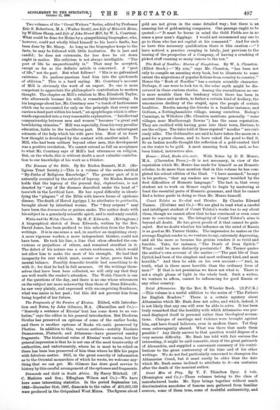Two volumes of the "Great Writers" Series, edited by Professor
Eric S. Robertson, M.A. (Walter Scott), are Life of Heinrich Heine, by William Sharp, and Life of John Stuart Hill, by W. L. Courtney. What could be done for Heine by a sympathising biographer, who, • however, could not wholly blind himself to his hero's faults, has been done by Mr. Sharp. As long as the biographer keeps to the facts, he may be followed with little hesitation. He is just and candid ; he does not extenuate, far less does he set down aught in malice. His criticism is not always intelligible. "The poet of life he unquestionably is." That may be accepted, except as far as the definite article is concerned. A "poet of life," not the poet. But what follows ? "His is no galvanised existence. No parlour-passions lead him into the quicksands of oblivion." This is a hard saying. Mr. Courtney's account of Mill is obviously the work of an expert. No one is more competent to appreciate the philosopher's contribution to modern thought. The chapter on Mill's relation to Mrs. Elizabeth Taylor, who afterwards became his wife, is remarkably interesting. In his language about her, Mr. Courtney sees "a touch of factiousness which can be accounted for only on the principle that every man carries a dead poet within his heart," an apophthegm which is after- wards expounded into a very reasonable explanation. "Intellectual companionship between men and women" becomes "a great and bewildering stimulus." Mill was especially, from his very peculiar education, liable to the bewildering part. Hence his extravagant estimate of the help which his wife gave him. Most of us know how thought is developed by the contact with another mind. To Mill, who had been solitary beyond other men, this development was a positive revelation. We cannot extend as full an acceptance to what Mr. Courtney says of Mill's last utterances on religion. But, on the whole, this is without doubt a most valuable contribu- tion to our knowledge of his work as a thinker.


















































 Previous page
Previous page